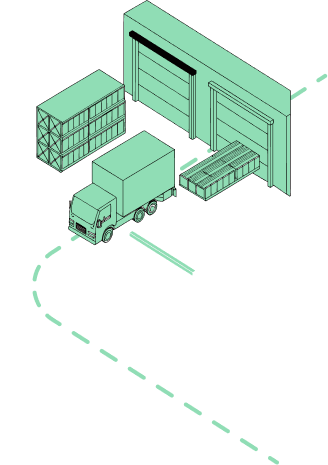12 Benefits of B2B eCommerce Platforms


Digital commerce among B2B businesses continues to grow. From being the exception a few years ago, it has now become the norm for most wholesale companies.
According to McKinsey, nearly 65% of B2B companies across industry sectors offer eCommerce capabilities, defined as fully executing a sales transaction online. At the same time, Statista estimates that in 2023, 17% of B2B sales will be generated digitally, while their value reaches $1.8 trillion in the U.S. alone.

The numbers are staggering, right? And while COVID-19 was a game-changer for many B2B companies that switched to digital sooner than they planned, the immense value and benefits an online platform brings to their table are undeniable.
This article presents twelve compelling ways a wholesale eCommerce platform can up the game for your wholesale business.
Top 12 benefits of a B2B eCommerce platform
1. Enhanced efficiency through automation
A wholesale eCommerce platform allows businesses to reduce manual labor and errors, streamline processes, and improve their daily operations’ efficiency. Employing a B2B eCommerce platform’s smart features means you can automate several vital processes to effortlessly take and fulfill orders, monitor inventory levels, and manage accounting from a single platform. Ultimately, this leads to better control and an easier way to run your business.
2. Around-the-clock availability and accessibility
Unlike traditional brick-and-mortar businesses with fixed opening hours, a wholesale website operates 24/7. Customers can access it and place orders anytime from anywhere in the world. And from any device, whether that’s a computer, a tablet, or a smartphone. With most wholesale platforms offering responsive, sleek, and mobile-friendly storefronts, busy professionals can complete purchases even when they’re on the move.
3. Improved customer experience
A B2B eCommerce platform provides buyers with a convenient and user-friendly experience designed to offer more than just transactions. In fact, 80% of wholesale companies invest heavily in their online channels to make them more appealing or irresistible than their offline options to ensure a superb customer experience.
For example, features such as online PDF catalogs, real-time order tracking, visibility into the shipping process, and seamless communication through messaging, notifications, and live updates on order status can significantly elevate customer experience and build customer satisfaction.

Ultimately, online wholesale platforms empower buyers to manage their accounts directly, place orders, and access order information without direct assistance. This self-service capability, enhanced by intuitive features (think of quick re-ordering, product recommendations, or multiple payment options), can forge more transparent, trusting, and responsive business relationships with your customers.
4. Personalization
It’s a truth universally acknowledged: one size doesn’t fit all. According to Penny Wilson, CMO at Appnovation, “No longer will people accept viral marketing. What consumers are expecting – and craving – is a more personalized, curated experience.”
A wholesale eCommerce platform lets you craft personalized experiences for buyers that create a unique customer purchasing journey. These may include custom pricing that fits each buyer just right, tailored product suggestions based on their preferences, promotions that resonate with their order history, or targeted discounts that reel them into your online B2B store.
5. Reduced operational costs
B2B eCommerce software significantly lowers operational costs over time for wholesalers and buyers by streamlining payments, invoices, and data entry processes, diminishing errors, and eliminating the need for extensive paperwork.
As customers breeze through your digital B2B store, sales executives and customer support agents can channel their energy on polishing up their services and focus on strategic tasks, like identifying upselling and cross-selling opportunities or analyzing feedback and suggesting new features to improve customer satisfaction on your platform, rather than menial tasks.
6. Better order and inventory control
Automating order processing and inventory management helps wholesale businesses track stock levels in real time, gracefully preventing overstock or stockouts. In other words, a B2B platform with a built-in order processing system that syncs with your inventory management software helps you monitor your stock more efficiently, minimizes data entry and optimizes order fulfillment processes.
7. Expanded global reach
As companies explore new, fast-growing international markets, a B2B eCommerce platform is the key to breaking down geographical barriers and reaching new customers. In practice, digital stores facilitate cross-border selling for businesses with features like multilingual product descriptions, multi-currency pricing, and catalogs tailored to the preferences and regulations of specific regions (e.g., product certifications or safety standards specifications).

8. Scalability
A B2B eCommerce platform can handle a large volume of orders and transactions. By definition, it’s easier to scale to accommodate the needs of a growing business or a company experiencing seasonal fluctuations in product demands (e.g., holiday decorations or ice cream sellers).
The flexible infrastructure of wholesale eCommerce software allows companies to implement significant changes in their online B2B stores’ setup without major overhaul painlessly. It can quickly scale up or down whether a business needs to push through a surge of orders, manage an extensive customer base, or, contrary to these, swiftly rein in its transactions.
9. Customization
Every business is unique and one-of-a-kind. Most B2B platforms are versatile and adaptable, tailored to your industry’s and business’s ever-evolving needs. Companies can deploy specific features to achieve greater operational efficiency and create an unparalleled customer experience.
For example, a furniture company manufacturing configurable kitchen cabinets may implement a request-for-quote (RFQ) system in their B2B store. This allows buyers to obtain quotes for the desired designs and materials.
10. ERP systems integration
Typically, B2B businesses employ various systems to effectively manage their day-to-day operations and juggle diverse tasks, such as accounting, purchasing, inventory, supply chain, sales, and human resources.
Most wholesale eCommerce platforms seamlessly integrate with Enterprise Resource Planning (ERP) systems, facilitating smooth collaboration between different business processes and departments and real-time monitoring of daily backend processes.
Ultimately, a B2B eCommerce ERP integration unlocks the full potential of a B2B company, from comprehensively managing every aspect of the business to working with improved operational efficiency.
11. Adaptability to market changes
Wholesale businesses with their own B2B eCommerce platforms can swiftly adapt to changing market conditions and emerging trends. For example, they can smoothly adjust their pricing strategies following market trends or renew product offerings based on customer preferences.
This automation-fostered flexibility also spurs more agile and competitive responses from SMBs, with 88% of them citing automation as a catalyst for being able to compete with larger companies, enabling faster operations and reducing human errors.
12. Reporting and data-driven insights
A wholesale eCommerce platform gathers data to generate rich reports and valuable insights into customer behavior, product preferences, order volume, and inventory turnover. This data can become a golden roadmap to success, guiding B2B companies to analyze order patterns, forecast product trends, or monitor discount performance.
At the end of the day, companies have all the necessary data at their fingertips to make informed business decisions, refine customer suggestions and offers, and discover untapped opportunities for selling.
Final words
Beyond delivering astounding benefits and promising remarkable growth for wholesale companies, B2B eCommerce platforms also emerge as champions for:
- Fortified security. Data protection and sensitive business and customer data safeguards are often a significant consideration for wholesale companies and buyers alike–especially for those operating in specific industries (think healthcare companies or companies with proprietary electronic systems).
- Eco-friendly operations by reducing paper usage and carbon footprint, eCommerce solutions pave the way for more environmentally sustainable business practices. Moreover, companies embracing greener methods witness a significant increase in their conversion and repeat purchase rates among loyal customers, according to Net0.

And there’s more: with a projected compound annual growth rate of 20.2% through 2030 in the B2B eCommerce market size, an online platform can transform your business, offering a more efficient, scalable, and customer-friendly environment.
Trying to figure out where to start? Request a demo today and explore how we can help you take your wholesale business online and simplify your daily operations without fuss.

Join fast-growing B2B wholesalers, distributors, and brands who are automating their businesses.
No one does B2B eCommerce like B2B Wave. We’re fast, intuitive, error-free, and integrate with your current stack.


.png)
.png)







.png)

.svg)